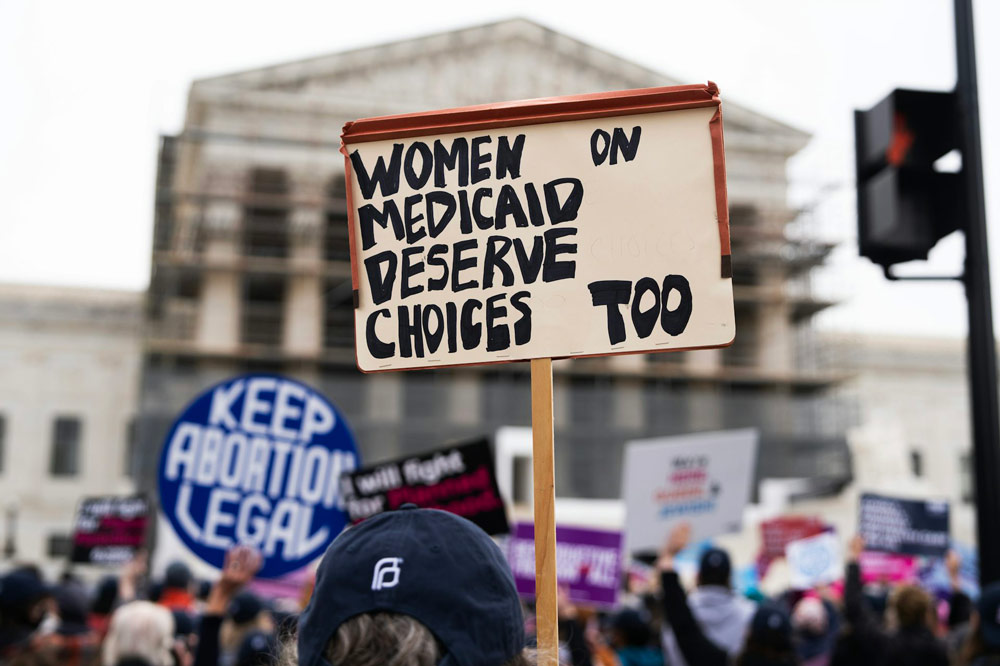By Sonia Suter and Naomi Cahn
Sonia Suter, George Washington University, and Naomi Cahn, University of Virginia
Many Americans take for granted the ability to select their own healthcare practitioner. However, on June 25, 2025, the conservative supermajority of the U.S. Supreme Court decided, 6-3, that those who depend on Medicaid for their health care do not have that right.
The lawsuit centers on a technical legal question: can Medicaid recipients sue state officials for denying them the choice of their healthcare provider? Justice Neil Gorsuch stated in his majority opinion that they don’t since the Medicaid Act did not expressly and unequivocally grant people that privilege.
As law academics who teach classes on reproductive justice, health, and poverty law, we believe that this decision may limit access to care for the more than 78 million Americans who receive their health insurance coverage through Medicaid.
Excluding Planned Parenthood
Julie Edwards, a Medicaid-eligible citizen of South Carolina, was in a difficult situation at the beginning of the case. Edwards was able to acquire care from a Planned Parenthood South Atlantic clinic in Columbia, South Carolina, after she battled to obtain contraceptive services.
One of the leading providers of reproductive services in the US is Planned Parenthood, a network of nonprofit organizations with over a century of history. Patients can receive physical examinations, cancer screenings, contraception, and other services at its two locations in South Carolina. Additionally, it maintains lengthy hours and offers same-day appointments.
However, Governor Henry McMaster of South Carolina issued an executive order in July 2018 prohibiting Medicaid funding for medical professionals in the state who provide abortion services.
As a result, Edwards was unable to shift all of her gynecological care to Planned Parenthood, a longtime target of conservatives, as she had intended, since the organization would no longer get reimbursement for any kind of service provided to Medicaid patients.
Edwards and Planned Parenthood filed a lawsuit against South Carolina. They claimed that by preventing Edwards from receiving care from the provider of her choosing, the state was in violation of the federal Medicare and Medicaid Act, which Congress established in 1965.
A free-choice-of-provider requirement
Medicaid is a federal-state cooperation that primarily serves low-income individuals, their children, and individuals with disabilities. Based on its authority under the Constitution’s spending clause, which permits Congress to impose restrictions on federal expenditures, Congress passed the legislation that gave rise to it.
Two years later, Congress added a free-choice-of-provider clause to Medicaid because of worries that states were limiting the providers that Medicaid patients may select from. It specifies that any organization, agency, community pharmacy, or individual who is qualified to provide the necessary service or services may offer such support to Medicaid enrollees.
The central point in this case was whether Medicaid participants had the right to sue under Section 1983, another federal legislation, even if the Medicaid statute does not by itself permit them to do so.
The Supreme Court has long acknowledged that Section 1983 safeguards a person’s right to file a lawsuit in cases when their rights under federal law have been infringed. In fact, the Medicaid Nursing Home Reform Act established such a right in 2023. The court determined that when a statute’s provisions clearly grant an individual federal right, Section 1983 grants the right to suit.
However, the court in Medina determined that there was no legal basis for a lawsuit. Rather, the court stressed that if a state is not adhering to the Medicaid Act, the usual remedy is for the federal government to stop providing Medicaid money to that state.
The result reversed earlier court rulings in Edwards’ favor. Additionally, it specifically disregarded the Supreme Court’s previous decisions, which the majority condemned for adopting a broader interpretation of its authority to infer private causes of action to enforce federal laws.
Restricting Medicaid funds
This conflict is only one phase of the protracted struggle in the United States for access to abortion. Proponents and opponents of abortion rights have fought about whether the government should support it, even if that money is done indirectly, in addition to whether it should be permitted.
Medicaid is prohibited from paying health care providers for abortions under a federal statute known as the Hyde Amendment, with a few exceptions: where a patient’s life is in danger or her pregnancy is the result of rape or incest. When their laws permit it, several states provide coverabortions without utilizing government funding.
Planned Parenthood consequently hardly ever receives federal Medicaid funding for abortions.
McMaster clarified that he did not want state monies to indirectly finance abortions, which is why he kicked Planned Parenthood and other abortion facilities out of the South Carolina Medicaid program.
Following the Supreme Court’s decision in this case, McMaster declared that he had stood up to preserve South Carolina’s authority and principles, as well as to uphold the sanctity of life, and that we had finally won.
As of 2022, however, abortion accounted for only under 4 percent of all Planned Parenthood services nationwide. Testing for sexually transmitted illnesses is its most popular service. Every year, Planned Parenthood treats over 2 million people nationwide, the majority of whom are low-income.
Consequences beyond South Carolina
The ramifications of this decision extend beyond South Carolina’s Medicaid system.
It might make it more difficult for people to file claims under any federal statute using Section 1983. In her dissent, Justice Ketanji Brown Jackson, supported by Justices Sonia Sotomayor and Elena Kagan, stated that the court is still working to stifle one of the nation’s most important civil rights legislation.
The civil rights law, which was passed in 1871, has been used to contest rights abuses committed against people by public servants. According to Jackson, the court now restricts the use of Section 1983 to defend individual rights exclusively in cases when the statutes contain the appropriate magic words.
The majority ruling, according to the dissent, is likely to do actual harm to actual persons. In addition to potentially depriving South Carolina Medicaid recipients of their sole effective means of exercising a right specifically granted to them by Congress, Jackson wrote, it may also deny those South Carolinians and innumerable other Medicaid recipients nationwide a very personal freedom: the choice of who provides care for us when we are most in need.
Wide-ranging effects could also result from the choice. Planned Parenthood is already prohibited from receiving Medicaid reimbursement for any type of medical care in Arkansas, Missouri, and Texas. Other states might do the same.
Disqualifying Planned Parenthood from Medicaid might also limit access to healthcare and raise the already high rate of unwanted pregnancies in America, considering the organization’s role in providing contraceptive services.
To further limit patients’ options, states may also attempt to bar providers on the basis of other traits, such as if their staff members are union members or whether they offer gender-affirming treatment.
The court’s decision permits states to exclude Planned Parenthood and other healthcare providers from the Medicaid program, which may soon resemble the patchwork now observed with regard to access to abortion.
![]()
Sonia Suter teaches law at George Washington University, and Naomi Cahn teaches law at the University of Virginia.







